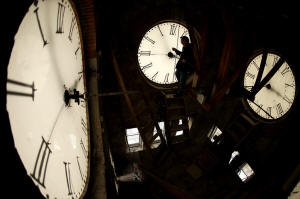How springing forward to daylight saving time could affect your health —
and how to prepare
[March 04, 2025]
By LAURAN NEERGAARD
WASHINGTON (AP) — Most of America “springs forward” Sunday for daylight
saving time and losing that hour of sleep can do more than leave you
tired and cranky the next day. It also could harm your health.
Darker mornings and more evening light together knock your body clock
out of whack — which means daylight saving time can usher in sleep
trouble for weeks or longer. Studies have even found an uptick in heart
attacks and strokes right after the March time change.
There are ways to ease the adjustment, including getting more sunshine
to help reset your circadian rhythm for healthful sleep.
When does daylight saving time start?
Daylight saving time begins Sunday at 2 a.m., an hour of sleep vanishing
in most of the U.S. The ritual will reverse on Nov. 2 when clocks “fall
back” as daylight saving time ends.
Hawaii and most of Arizona don’t make the spring switch, sticking to
standard time year-round along with Puerto Rico, American Samoa, Guam
and the U.S. Virgin Islands. Worldwide, dozens of countries also observe
daylight saving time, starting and ending at different dates.
Some people try to prepare for daylight saving time’s sleep jolt by
going to bed a little earlier two or three nights ahead. With a third of
American adults already not getting the recommended seven hours of
nightly shuteye, catching up can be difficult.
What happens to your brain when it's lighter later?
The brain has a master clock that is set by exposure to sunlight and
darkness. This circadian rhythm is a roughly 24-hour cycle that
determines when we become sleepy and when we’re more alert. The patterns
change with age, one reason that early-to-rise youngsters evolve into
hard-to-wake teens.

Morning light resets the rhythm. By evening, levels of a hormone called
melatonin begin to surge, triggering drowsiness. Too much light in the
evening — that extra hour from daylight saving time — delays that surge
and the cycle gets out of sync.
Sleep deprivation is linked to heart disease, cognitive decline, obesity
and numerous other problems. And that circadian clock affects more than
sleep, also influencing things like heart rate, blood pressure, stress
hormones and metabolism.
How does the time change affect your health?
Fatal car crashes temporarily jump the first few days after the spring
time change, according to a study of U.S. traffic fatalities. The risk
was highest in the morning, and researchers attributed it to sleep
deprivation.
[to top of second column]
|

Custodian Ray Keen inspects a clock face before changing the time on
the 100-year-old clock atop the Clay County Courthouse, March 8,
2014, in Clay Center, Kansas. (AP Photo/Charlie Riedel, File)
 Then there’s the cardiac connection.
The American Heart Association points to studies that suggest an
uptick in heart attacks on the Monday after daylight saving time
begins, and in strokes for two days afterward.
Doctors already know that heart attacks, especially
severe ones, are a bit more common on Mondays generally — and in the
morning, when blood is more clot-prone.
Researchers don't know why the time change would add to that Monday
connection but it's possible the abrupt circadian disruption
exacerbates factors such as high blood pressure in people already at
risk.
How to prepare for daylight saving time
Gradually shift bedtimes about 15 or 20 minutes earlier for several
nights before the time change, and rise earlier the next morning,
too. Go outside for early morning sunshine that first week of
daylight saving time, another way to help reset your body's internal
clock. Moving up daily routines, like dinner time or when you
exercise, also may help cue your body to start adapting, sleep
experts advise.
Afternoon naps and caffeine as well as evening light from phones and
other electronic devices can make adjusting to an earlier bedtime
even harder.
Will the U.S. ever eliminate the time change?
Every year there's talk about ending the time change. In December,
then-President-elect Donald Trump promised to eliminate daylight
saving time. For the last several years, a bipartisan bill named the
Sunshine Protection Act to make daylight saving time permanent has
stalled in Congress; it has been reintroduced this year.
But that's the opposite of what some health groups recommend. The
American Medical Association and American Academy of Sleep Medicine
agree it's time to do away with time switches but say sticking with
standard time year-round aligns better with the sun — and human
biology — for more consistent sleep.
All contents © copyright 2025 Associated Press. All rights reserved
 |